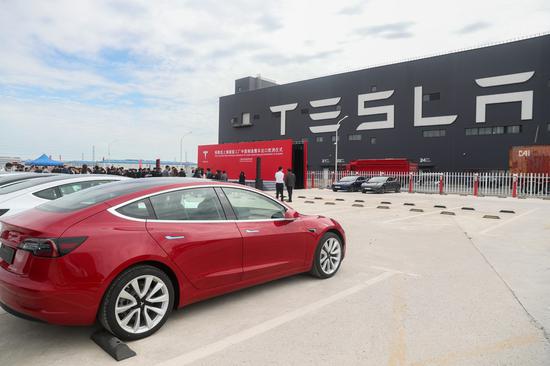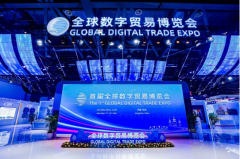
Photo taken on Oct. 26, 2020 shows the Tesla China-made Model 3 vehicles at its gigafactory in Shanghai, east China. (Xinhua/Ding Ting)
U.S. carmaker Tesla began exporting its made-in-China Model 3 to Europe on Tuesday, signaling the rapid development of foreign automakers in China amid the country's opening up of the auto sector.
The first batch of 7,000 sedans manufactured by Tesla Shanghai gigafactory, the company's first overseas plant, departed from Shanghai by sea. They are expected to arrive at the port of Zeebrugge in Belgium at the end of November, and sold in European countries including Germany, France, Italy, Spain, Portugal and Switzerland.
"Despite the impact of COVID-19, the construction and operation of the gigafactory maintained rapid progress with the support and help of Chinese governments at all levels and partners," said Tom Zhu, vice president of Tesla Global and president of Tesla Greater China.
Exporting made-in-China Model 3 sedans to Europe is a milestone in the development of the Tesla Shanghai gigafactory, proving to the world China's speed in construction as well as the quality of made-in-China products, said Zhu.
Tesla will continuously improve its production, sales, after-sales service and infrastructure in the country by honoring its China investment commitment, Zhu said.
Tesla's gigafactory is the first solely foreign-invested car plant after China's scrapping of caps on foreign ownership of new energy vehicle (NEV) ventures, according to Chen Yin, executive deputy mayor of Shanghai.
The factory broke ground in early 2019 in Lingang Area, a new section of the Shanghai Pilot Free Trade Zone. Earlier this year, Tesla began to deliver made-in-China Model 3 sedans to the public.
The Shanghai plant had churned out more than 85,000 vehicles with an industrial output of over 21.6 billion yuan (about 3.2 billion U.S. dollars) by the end of September, with the weekly production stabilizing at 3,500 to 4,000 vehicles. Exports of vehicles and batteries by the plant are estimated to reach 450 million U.S. dollars within the year, Chen said.
"Relying on China's strong industrial chain advantages and advanced manufacturing level, the global competitiveness of the China-made Model 3 is very strong," said Song Gang, manufacturing and operation director of the Tesla Shanghai Gigafactory. "Exporting to Europe means the quality of made-in-China Model 3 sedans has been recognized by the European market."
As China further relaxes restrictions on foreign ownership in the auto industry and boosts development of NEVs, more foreign carmakers are eyeing the growing Chinese market.
Also on Tuesday, SAIC Volkswagen's NEV plant was put into production, as a purely electric medium-sized SUV rolled off its production line. With a total investment of about 17 billion yuan, the new factory is expected to have an annual production capacity of 300,000 units.
Wang Xiaoqiu, president of SAIC Motor, a major Chinese automaker based in Shanghai, said the company will deepen strategic cooperation with Volkswagen Group in electrification, intelligent networking and high-end branding.
Earlier this month, China's leading automaker First Automotive Works (FAW) and German automaker Audi signed a memorandum of understanding on the establishment of a joint venture for production of electric vehicles.
Cui Dongshu, secretary general of the China Passenger Car Association (CPCA), said that Tesla's exports prove that China's auto products have comprehensive product advantages in the world, and the SAIC Volkswagen's new plant will accelerate the development of NEVs in China.
In September, China's auto sales rose 12.8 percent year on year to 2.57 million units as the market warmed alongside government policies to spur consumption.
The sales of passenger vehicles gained 8 percent year on year to 2.09 million units, while those of NEVs surged 67.7 percent to 138,000 units, according to the China Association of Automobile Manufacturers.
Paul Gong, head of China Auto Research at UBS, said the country's NEV industry has made considerable progress in terms of product performance, quality, and cost competitiveness over the years.
"In the historical transition period from fuel vehicles to electric ones, the focus of the global automotive industry is shifting to China," he said.

